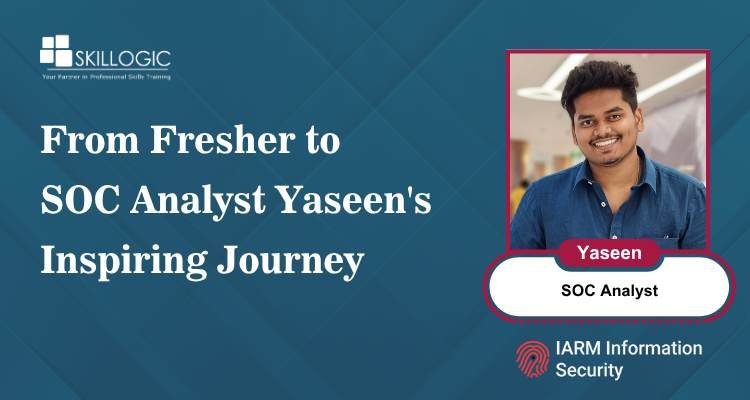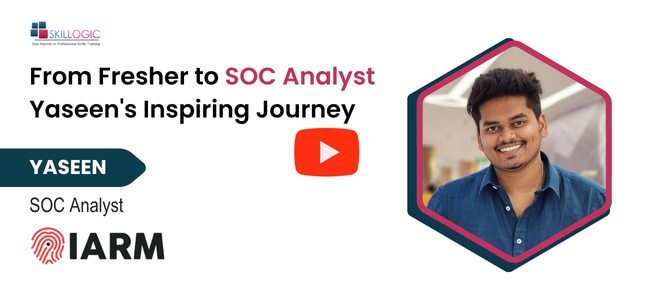From Fresher to SOC Analyst Yaseen's Inspiring Journey
Discover how Yaseen transformed his career from a complete fresher to a successful SOC Analyst through dedication, the right training, and hands-on learning. His inspiring journey highlights the opportunities in the cyber security field and how focused upskilling can lead to real career breakthroughs.

Yaseen’s journey into cyber security is a powerful example of how passion and perseverance can lead to a successful career switch. Coming from a Mechatronics background, he discovered his interest in cyber security during an internship and made the bold decision to transition into the field. Despite having no formal IT background, he dedicated himself to gaining practical skills, completing hands-on projects, and preparing thoroughly for interviews.
With the right training and placement support from SKILLOGIC, Yaseen built a strong foundation in cyber security and eventually secured his first role as a SOC Analyst at IARM Information Security. Here, he shares his story, key learnings, and valuable advice for others looking to enter the cyber security domain.
Yaseen’s Journey from Mechatronics to SOC Analyst
Here’s an inside look at Yaseen’s transition into cyber security. He shares how he shifted from Mechatronics, navigated his training at SKILLOGIC, overcame interview hurdles, and landed his first role as a SOC Analyst:
Q1: Could you begin by telling us about your background?
I completed my graduation in 2020 and pursued my M.Tech in Mechatronics, finishing in 2023. During my master's, I interned at an MNC, where I was first introduced to cyber security, specifically in the automobile sector. That’s when I realized my growing interest in the field.
Q2: How did your internship introduce you to cyber security? What exactly did you work on?
In the internship, we performed penetration testing on Electronic Control Units and sensor devices in vehicles, including bikes. I found the hands-on testing and internal system analysis fascinating. We worked on simulating attacks and analyzing security flaws, which sparked my curiosity about cyber security as a full-time profession.
Q3: With a degree in Mechatronics, what made you decide to shift into cyber security?
Though Mechatronics is different from cyber security, there was a course in my M.Tech related to vehicle electronics, which complemented the internship. When I started working on real-world security testing tasks, I discovered that I enjoyed this kind of problem-solving more than mechanical engineering. That passion led me to explore formal training in cyber security.
Q4: How did you come across SKILLOGIC and why did you choose it?
I searched online for the best platforms to learn cyber security. SKILLOGIC stood out due to its structured curriculum and placement assistance. When I reached out, I was impressed by the placement roadmap, resume building support, mock interviews, and real-world projects. I felt confident it was the right choice for me.
Q5: Was your learning experience at SKILLOGIC online or offline?
I attended the course offline at the SKILLOGIC Bangalore center. I started in July and the journey lasted almost a year, which gave me a solid foundation in both theory and practical aspects of cyber security.
Q6: How was the classroom experience? Was it mostly theoretical or did you get hands-on training?
It was a mix of both. Theoretical sessions were complemented by hands-on labs where we practiced software installations, attack simulations, and other cyber security techniques. Our trainer, Fatima ma’am, used real-world analogies and examples to make concepts easier to understand. That helped a lot in bridging the gap between theory and industry practice.
Q7: Outside of class hours, how much time did you dedicate to learning and practice?
On average, I spent about 2 to 3 additional hours daily. Akbar sir recommended Coursera courses as well, which I took up to deepen my understanding. When I was especially interested in a topic, I would dedicate even more time to practicing and completing modules.
Q8: Were your doubts and learning challenges addressed properly during the course?
Absolutely. The faculty was very supportive. They would often sit beside us, guiding us through difficult steps and clearing all our doubts. It was an environment where help was always available.
Q9: Could you please tell us about the projects you completed as part of the course?
I completed two key projects: one using Burp Suite and the other with Wireshark. With Wireshark, I captured and analyzed network traffic to determine if data was encrypted or sent in plain text. Using Burp Suite, I simulated brute force attacks to test login vulnerabilities. These projects significantly boosted my confidence and gave me practical exposure.
Q10: How did the SKILLOGIC team support you during resume building and placements?
They played a big role. I first drafted my resume and sent it to the team, who reviewed it in detail and suggested improvements. They helped prepare the resume to highlight my cyber security skills and projects. I also attended mock interviews, which were very helpful in preparing for real-world interviews.
Q11: How was your job-hunting experience? Were all your applications through SKILLOGIC?
I applied to jobs both independently and through the SKILLOGIC placement team. The placement team frequently shared job openings, and if my resume matched, they scheduled interviews for me. They also provided frequently asked questions and tips before each interview to help me prepare effectively.
Q12: How many interviews did you attend before landing your current job?
I attended about 5 to 6 interviews. Each one taught me something new, especially the ones where I wasn’t selected. In one case, I didn’t clear the round because the company was hiring for a defensive role like SOC analysis, whereas my background leaned more toward offensive testing.
Q13: Could you tell us more about your successful interview? How many rounds were there?
There were 4 rounds: an aptitude test, two technical rounds, and a final interaction with the CEO. In the technical rounds, I was asked about my stream switch, my knowledge of network protocols, firewalls, OSI models, and more. One round involved writing a sample email to warn users about phishing attacks, which tested both my technical and communication skills.
Q14: Was this job opportunity provided through SKILLOGIC's placement team?
Yes, it was. They shared my resume with the company, and I was invited for an offline interview. That’s how I landed my first job as a SOC Analyst.
Q15: What advice would you give to someone from a non-cyber security background looking to make the switch?
Only pursue cyber security if you are genuinely interested in it. It requires effort and consistent learning. Don’t do it just for the title or hype. Your interest will determine your success. You don't need to study for 10 hours a day, but regular learning, say, 2 to 3 hours daily makes a big difference. Also, make use of all resources available, both from the training institute and outside.
Q15: How would you summarize your overall experience with SKILLOGIC?
It was amazing. Every phase, learning, project work, and placement was supported by different teams. Faculty members like Fatima ma’am and Akbar sir provided deep insights and real-world examples. The placement team guided me through resume writing, mock interviews, and job applications. At no point did I feel alone in the journey.
Refer these articles:
- Bhuvan’s Path to Becoming a Cyber Security Expert
- Hari Charan’s Journey to Cyber Security Success
- Swathi's Cyber Security Journey from Mechanical Engineering
Highlights from Yaseen’s Cyber Security Journey
With dedicated effort and strong guidance from SKILLOGIC, Yaseen successfully transitioned from Mechatronics to a SOC Analyst role. Here are the key takeaways from his journey:
- Passion-Driven Career Shift: An internship in automotive security sparked his genuine interest in cyber security.
- Hands-On Projects Boosted Confidence: Practical work using tools like Wireshark and Burp Suite built real-world skills.
- Offline Classes for Deeper Learning: Attending in-person sessions at the Bangalore center allowed structured learning and live support.
- Supportive Faculty: Trainers like Fatima Ma’am and Akbar Sir made complex topics relatable with real-world examples.
- Daily Practice Made the Difference: Studying 2 to 3 hours outside class helped reinforce concepts and build consistency.
- Resume and Interview Prep Were Game-Changers: Personalized resume reviews and mock interviews prepared him for real job scenarios.
- Learning from Rejection: Early interview failures helped him understand job-role alignment and improve preparation.
- Placement Support: SKILLOGIC’s placement support directly connected him to his first SOC Analyst role.
- Consistency Over Hype: He advises aspiring professionals to pursue cyber security only if genuinely interested and to learn steadily.
Refer these articles:
- How to Become a Cyber Security Expert in Mumbai
- Top Tips for Selecting the Best Cyber Security Institute in Mumbai
- How to Become a Cyber Security Expert in Hyderabad
- How to Choose Best Institute for Cyber Security in Hyderabad
In short, Yaseen’s journey from Mechatronics to SOC Analyst at IARM Information Security reflects the impact of focused learning, consistent practice, and structured guidance. Through real-world projects and in-depth training at SKILLOGIC, he developed the technical and professional skills needed to thrive in the cyber security industry.
His story emphasizes the importance of pursuing cyber security out of genuine interest, staying consistent with learning, and leveraging mentorship and placement support. For anyone considering a career shift into cyber security, Yaseen’s experience proves that with the right mindset and training, success is well within reach. According to Grand View Research, the global cyber security market was projected to grow to USD 500.7 billion by 2030. Joining a cyber security institute offers a solid foundation to tap into this booming industry, with a wide range of academic programs and hands-on certification courses designed to meet evolving industry demands.
Whether you're starting your career in cyber security or aiming to upskill for better opportunities, enrolling in a cyber security course in Mumbai is a smart and strategic step. As India’s financial capital and a growing tech and fintech powerhouse, Mumbai is home to leading IT firms, banks, startups, and digital enterprises all of which are driving demand for skilled cyber security professionals. With access to high-quality training, industry networking events, and real-world project exposure, Mumbai offers a dynamic environment to build hands-on expertise and accelerate your cyber security career.
SKILLOGIC is a leading name in cyber security training in India, known for delivering immersive, hands-on learning aligned with current industry demands. SKILLOGIC’s offline cyber security course in Hyderabad is designed to prepare learners for real-world challenges through expert-led instruction and lab-based simulations. With additional training centers across cities like Chennai, Hyderabad, Pune, Delhi, Ahmedabad, Coimbatore, and Kochi, SKILLOGIC ensures consistent, high-quality learning nationwide.
The Cyber Security Professional Plus Program by SKILLOGIC accredited by NASSCOM FutureSkills and IIFIS is led by more than 100 seasoned trainers and focuses on core areas such as ethical hacking, network defense, penetration testing, and cyber risk management. Learners also benefit from 24/7 access to cloud labs, globally recognized certifications, multiple learning formats, and end-to-end placement support.
With over 1 lakh professionals trained across India, SKILLOGIC continues to empower individuals with future-ready skills. In Hyderabad’s vibrant tech-driven landscape, the institute stands out as a trusted destination for building a strong and successful career in cyber security.


0
174